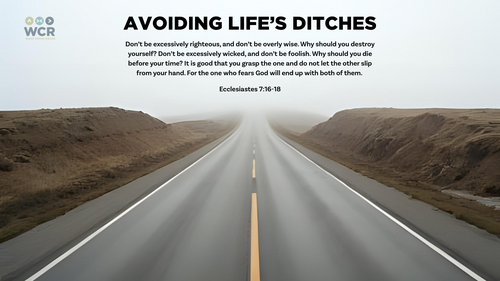May 21st, 2025
by Wake Cross Roads Baptist
by Wake Cross Roads Baptist
Life often presents us with confounding moments that leave us scratching our heads. Why do righteous people sometimes suffer while the wicked seem to prosper? How should we respond when life doesn't make sense?
In a recent sermon exploring Ecclesiastes 7:14-22, we examined what might be called "unusual exhortations" that provide wisdom for navigating life's most puzzling circumstances.
In a recent sermon exploring Ecclesiastes 7:14-22, we examined what might be called "unusual exhortations" that provide wisdom for navigating life's most puzzling circumstances.

The Enigma of Life
Koheleth, the author of Ecclesiastes, makes a striking observation in verse 15:
"In my brief life I have seen everything. Someone righteous perishes in spite of his righteousness, and someone wicked lives long in spite of his evil."
This paradox troubles us deeply. We naturally expect good things for good people and consequences for the wicked. Yet life rarely follows such neat patterns. We've all witnessed the faithful missionary killed while serving others, or the corrupt individual who seems to escape accountability while living a long life.
"In my brief life I have seen everything. Someone righteous perishes in spite of his righteousness, and someone wicked lives long in spite of his evil."
This paradox troubles us deeply. We naturally expect good things for good people and consequences for the wicked. Yet life rarely follows such neat patterns. We've all witnessed the faithful missionary killed while serving others, or the corrupt individual who seems to escape accountability while living a long life.
Two Ditches to Avoid
Koheleth warns us about two common but dangerous reactions to life's enigmas:
Ditch #1: Excessive Righteousness
"Don't be excessively righteous, and don't be overly wise. Why should you destroy yourself?" (v.16)
This isn't suggesting we should avoid righteous living. Rather, Koheleth warns against self-righteous legalism - the belief that we can somehow earn God's favor through our own efforts. When we see good people suffering, we might think, "If I just try harder, be more righteous, give more effort - maybe God will spare me from similar fate."
This approach ultimately crushes us because, as verse 20 reminds us, "There is certainly no one righteous on the earth who does good and never sins." We simply cannot achieve righteousness through our own strength.
This isn't suggesting we should avoid righteous living. Rather, Koheleth warns against self-righteous legalism - the belief that we can somehow earn God's favor through our own efforts. When we see good people suffering, we might think, "If I just try harder, be more righteous, give more effort - maybe God will spare me from similar fate."
This approach ultimately crushes us because, as verse 20 reminds us, "There is certainly no one righteous on the earth who does good and never sins." We simply cannot achieve righteousness through our own strength.
Ditch #2: Excessive Wickedness
"Don't be excessively wicked, and don't be foolish. Why should you die before your time?" (v.17)
The opposite ditch is equally dangerous. When we see the wicked prospering, we might conclude, "What's the point of living right? I might as well do whatever I want!" Koheleth warns that this path leads to destruction, often cutting life short through the natural consequences of destructive choices.
The opposite ditch is equally dangerous. When we see the wicked prospering, we might conclude, "What's the point of living right? I might as well do whatever I want!" Koheleth warns that this path leads to destruction, often cutting life short through the natural consequences of destructive choices.
The Road Between: Walking in Truth
Instead of swerving into either ditch, Koheleth points us to the middle road:
"It is good that you grasp the one and do not let the other slip from your hand, for the one who fears God will end up with both of them." (v.18)
The key is not balancing sin and righteousness, but rather walking in the fear of God - recognizing both our sinfulness and our need for His grace. Koheleth reinforces this in verse 20:
"There is certainly no one righteous on the earth who does good and never sins."
This truth is profoundly humbling. It reminds us that we all "live in shattered houses because of our sin" and share a common need for God's grace. When we're tempted to judge others harshly, we need only remember our own failings.
"It is good that you grasp the one and do not let the other slip from your hand, for the one who fears God will end up with both of them." (v.18)
The key is not balancing sin and righteousness, but rather walking in the fear of God - recognizing both our sinfulness and our need for His grace. Koheleth reinforces this in verse 20:
"There is certainly no one righteous on the earth who does good and never sins."
This truth is profoundly humbling. It reminds us that we all "live in shattered houses because of our sin" and share a common need for God's grace. When we're tempted to judge others harshly, we need only remember our own failings.
The Beauty of the Gospel
The conclusion of this passage points beautifully to our need for Christ. Jesus was the only one who ever lived a perfectly righteous life - the only exception to verse 20's statement. He lived the righteous life we couldn't live, then died the death we deserved, so that we might receive forgiveness and life through Him.
This is why the gospel isn't just a saving message but a transforming one. When we truly understand our need and God's grace, we don't respond with either legalistic striving or licentious living. Instead, we walk in grateful dependence, knowing that "Lord, I need You, every hour I need You."
This is why the gospel isn't just a saving message but a transforming one. When we truly understand our need and God's grace, we don't respond with either legalistic striving or licentious living. Instead, we walk in grateful dependence, knowing that "Lord, I need You, every hour I need You."
Living in Response
So how do we respond to life's confounding moments? Koheleth's wisdom gives us practical guidance:
In a culture that champions independence, may we instead live in sweet dependence on Him, testifying through our lives that we have a strength not our own - the power of Christ living in us.
- Avoid the ditches of legalism and license. Recognize both extremes as dangerous reactions to life's enigmas.
- Recognize your need for God's grace through Christ. Embrace the humbling truth that we cannot save ourselves.
- Walk in humble dependence. True wisdom begins with the fear of the Lord.
- Live out the transforming gospel. Let your life demonstrate the power of Christ living in you.
In a culture that champions independence, may we instead live in sweet dependence on Him, testifying through our lives that we have a strength not our own - the power of Christ living in us.
"Don't overreact to life's confounding moments. Walk in truth."
Life will continue to present us with enigmas - moments when the righteous suffer and the wicked prosper. But Ecclesiastes reminds us that these circumstances aren't the whole story. By avoiding the ditches of excessive righteousness and excessive wickedness, we can walk the path of wisdom - acknowledging our need for grace, living in humble dependence on God, and finding our hope in Christ alone.
When life doesn't make sense, we don't need to have all the answers. We simply need to know the One who does, and to trust that His ways, though often mysterious to us, are ultimately good.
What confounding circumstances have you faced recently? How have you responded? We'd love to hear your thoughts in the comments below.
When life doesn't make sense, we don't need to have all the answers. We simply need to know the One who does, and to trust that His ways, though often mysterious to us, are ultimately good.
What confounding circumstances have you faced recently? How have you responded? We'd love to hear your thoughts in the comments below.

No Comments